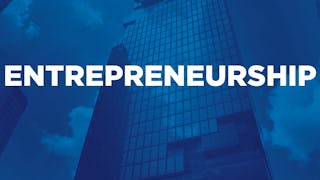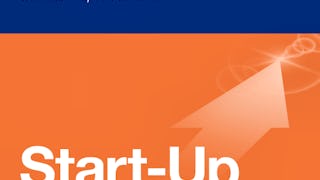How does a good idea become a viable business opportunity? What is entrepreneurship and who fits the profile of an entrepreneur? This introductory course is designed to introduce you to the foundational concepts of entrepreneurship, including the definition of entrepreneurship, the profile of the entrepreneur, the difference between entrepreneurship and entrepreneurial management, and the role of venture creation in society. You’ll explore where technology entrepreneurship and impact entrepreneurship align and where they diverge, and you’ll learn proven techniques for identifying the opportunity, assessing the opportunity, hypothesis testing and creating a prototype.

This Labor Day, enjoy $120 off Coursera Plus. Unlock access to 10,000+ programs. Save today.


Entrepreneurship 1: Developing the Opportunity
This course is part of Entrepreneurship Specialization



Instructors: Lori Rosenkopf
160,181 already enrolled
Included with 
(4,367 reviews)
Skills you'll gain
Details to know

Add to your LinkedIn profile
4 assignments
See how employees at top companies are mastering in-demand skills

Build your subject-matter expertise
- Learn new concepts from industry experts
- Gain a foundational understanding of a subject or tool
- Develop job-relevant skills with hands-on projects
- Earn a shareable career certificate

There are 5 modules in this course
This module was designed to introduce you to the team of Wharton professors who are teaching this course and others in the Entrepreneurship Specialization. You will also discover that entrepreneurship has different applications and even different definitions in academia and in practice. By the end of this short module, you'll know what entrepreneurship means to you and others, and understand some of the common arguments about entrepreneurship as a field of study.
What's included
3 videos
This module was designed to introduce you to the broad definition of the diverse topic of entrepreneurship and to give you an overview of the field. You'll learn the types of entrepreneurs, the most common categories of entrepreneurial ventures, and their key differentiating factors. Using real world examples, you'll see entrepreneurship in action in a wide variety of environments, from small businesses to social enterprises to large corporations. At the end of this module, you'll be able to define what entrepreneurship means to you, whether or not you fit the profile of the entrepreneur, and how to classify your venture to others. You'll also be able to cite current examples of successful entrepreneurial enterprises to support your own venture.
What's included
9 videos2 readings1 assignment
In this module, you'll learn how to discover, develop, and assess opportunities, so you can choose one that has the best potential for success. Starting an enterprise is uncertain by nature, but you can increase certainty and decrease some risk by evaluating potential opportunities using thoughtful processes proven to help you decide which opportunities are better positioned for growth. You'll learn how to determine a market need, develop a solution, evaluate your solution using a variety of methods, and pressure test your idea. You'll also learn several methods of evaluating opportunity, including using customers, the VIDE model, and the tournament method. You'll see these processes applied to real world examples of both opportunities which were ultimately successful and those that failed. By the end of this module, you'll be able to apply these evaluation process to your own opportunities, and/or use them to discover new ones with greater potential for growth.
What's included
7 videos2 readings1 assignment
This module will help you define your market, identify your user, harness the wisdom of the crowd, and come up with an informed plan for your venture. You'll learn market segmentation, how to determine user needs, how to use the competitive landscape as well as potential users to refine your idea, and how to create a simple but powerful plan for your start-up that will allow you to avoid common mistakes and pitfalls. By the end of this module, you'll be able to refine your own pitch, develop a clearer picture of your user, and develop a useful model for your own enterprise.
What's included
8 videos2 readings1 assignment
In this module, you'll learn how to pitch your idea, test it, and create a prototype. You'll learn why there's no single formula for a successful pitch, the best techniques for formulating good surveys, and strategies for creating prototypes for physical goods, software, and services. By the end of this module, you'll be be able to identify the key components of a successful pitch, know how to use surveys effectively to test your idea, and come up with a plan for building a prototype of your own product or service.
What's included
8 videos2 readings1 assignment
Earn a career certificate
Add this credential to your LinkedIn profile, resume, or CV. Share it on social media and in your performance review.
Instructors


Offered by
Explore more from Finance
 Status: Free Trial
Status: Free TrialFundação Instituto de Administração
 Status: Free Trial
Status: Free TrialUniversity of Pennsylvania
 Status: Free Trial
Status: Free TrialTechnion - Israel Institute of Technology
 Status: Free Trial
Status: Free TrialUniversity of California, Irvine
Why people choose Coursera for their career




Learner reviews
4,367 reviews
- 5 stars
82.50%
- 4 stars
14.99%
- 3 stars
1.80%
- 2 stars
0.29%
- 1 star
0.38%
Showing 3 of 4367
Reviewed on May 12, 2023
This has been a great learning opportunity. The content is well-detailed. The well-thought-out interviews added in each section are insightful too. Thank you to all the participating instructors.
Reviewed on May 27, 2017
Well prepared information, lessons and resources. Panel of experts - a team approach to articulating the course. Each bringing their own skills and experiences making it more personable.
Reviewed on Mar 22, 2021
The course is inspiring and I want to thank the creators of the course. I started to apply planning methods, learned the nuances of interviews. And now I'm thinking about making a prototype.

Open new doors with Coursera Plus
Unlimited access to 10,000+ world-class courses, hands-on projects, and job-ready certificate programs - all included in your subscription
Advance your career with an online degree
Earn a degree from world-class universities - 100% online
Join over 3,400 global companies that choose Coursera for Business
Upskill your employees to excel in the digital economy
Frequently asked questions
To access the course materials, assignments and to earn a Certificate, you will need to purchase the Certificate experience when you enroll in a course. You can try a Free Trial instead, or apply for Financial Aid. The course may offer 'Full Course, No Certificate' instead. This option lets you see all course materials, submit required assessments, and get a final grade. This also means that you will not be able to purchase a Certificate experience.
When you enroll in the course, you get access to all of the courses in the Specialization, and you earn a certificate when you complete the work. Your electronic Certificate will be added to your Accomplishments page - from there, you can print your Certificate or add it to your LinkedIn profile.
If you subscribed, you get a 7-day free trial during which you can cancel at no penalty. After that, we don’t give refunds, but you can cancel your subscription at any time. See our full refund policy.
More questions
Financial aid available,



